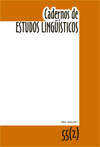Resumo
Este artigo apresenta um panorama do problema da violência nos estudos sobre a significação. Apontamos que a violência não é um traço acidental no uso da língua: a violência tanto oblitera o significado quanto gera, talvez como efeito perlocucionário, novas possibilidades de significação. O artigo propõe inicialmente uma crítica à posição vitalista nos estudos da linguagem. Em seguida, o trabalho propõe, numa visada pragmática, uma definição para violência linguística. Chamamos de violentos os usos linguísticos que posicionam o outro – especialmente aquele que representa a raça, o gênero, a sexualidade e o território que não se quer habitar – num lugar vulnerável. Trata-se de usos que atingem o sujeito em seu ponto mais frágil, a sua condição. O artigo finalmente analisa a mediação de um caso recente de crime de racismo, uma instância de uso violento da língua.Referências
ADORNO, S. Violência e crime: sob o domínio do medo na sociedade brasileira. In: BOTELHO, A. et al. (Org.). Agenda Brasileira: Temas de uma Sociedade em Mudança. São Paulo: Cia. das Letras. 2011, pp. 554-565.
AGHA, A. Meet mediatization. Language & Communication. 2011, 31:163-170.
ASAD, T. Formations of the secular: Christianity, Islam, Modernity. Stanford: Stanford University Press, 2003.
ASAD, T. Reflections on blasphemy and secular criticism. In: de Vries, H. (Ed.) Religion: Beyond a concept. Fordham: Fordham University Press. 2008, pp.580-609.
AUSTIN, J. How to do things with words. Cambridge: Harvard University Press, 1962.
BOURDIEU, P. Outline of a Theory of Practice. Trad. Richard Nice. Cambridge: Cambridge University Press, 1977.
BOURDIEU, P. Language and symbolic power. Trad. G. Raymond & M. Adamson. Cambridge: Harvard University Press, 1991.
BOUSFIELD, D. Impoliteness in interaction. Amsterdam: John Benjamins, 2008.
BOUSFIELD, D. & M. Locher (Orgs.) Impoliteness in Language: Studies on its Interplay with Power in Theory and Practice. Berlin: Mouton de Gruyter, 2008.
BRIGGS, C. Mediating infanticide: Theorizing relations between narrative and violence. Cultural Anthropology. 2007a, 22(3):315-316.
BRIGGS, C. Anthropology, interviewing, and communicability in contemporary social life. Current Anthropology. 2007b, 48(4):551-580.
BRIGGS, C. On virtual epidemics and the mediatization of public health. Language & Communication. 2011, 31:217-228.
BROWN, P. & S. Levinson. Politeness: Some Universals in Language Usage. Cambridge: Cambridge University Press, 1987 [1978].
BUTLER, J. Excitable speech: a politics of the performative. London: Routledge, 1997.
CALDEIRA, T. City of Walls: Crime, segregation and citizenship in São Paulo. Berkeley: University of California Press, 2000.
COTTINGHAM, J. Dicionário Descartes. Trad. Helena Martins. Rio de Janeiro: Zahar, 1995.
CULPEPER, J. Impoliteness: Using Language to Cause Offence. Cambridge: Cambridge University Press, 2011.
CHEAH, P. Spectral nationality: The living on [sur-vie] of the postcolonial nation in neocolonial globalization. Boundary, 1999, 2, 26(3):225-252.
DERRIDA, Jacques. Signature Event Context. Trad. Samuel Weber & Jeffrey Mehlam. Glyph. 1977, 1: 172-197.
DERRIDA, Jacques. Gramatologia. Trad. Miriam Chnaiderman e Renato Janine Ribeiro. São Paulo: Perspectiva, 1973.
FELDMAN, Allen. Violence and vision: The prosthetics and aesthetics of terror. In: Das, V. et al. (Orgs.) Violence and subjectivity. Berkeley: University of California Press. 2000, pp. 46-78.
FOUCAULT, Michel. What is an author? In: Faubian, J. (Org.) Aesthetics, Method and Epistemology. New york: The New Press. 1998[1969], pp. 205-222.
FREGE, G. Sobre o sentido e a referência. In: Alcoforado, P. (Org.) Lógica e filosofia da linguagem. São Paulo: Cultrix. 1978[1894], pp. 59-86.
FREUD, S. O mal-estar na civilização. Trad. de José Octávio de Aguiar Abreu. Rio de Janeiro: Imago, 1997[1930].
GIBBS Jr., R., Lima, Paula L. C & E. Françozo. Metaphor is grounded in embodied experience. Journal of Pragmatics. 2001, 36: 1189-1210.
GRADY, J. Foundations of meaning: primary metaphors and primary scenes. tese de doutorado, University of California, Berkeley, 1997.
GRICE, P. Logic and conversation. In: Cole, P. & J. Morgan (Orgs.) Syntax and Semantics 3: Speech Acts. London: Academic Press. 1975, pp.41-58.
GRICE, P. Studies in the Way of Words. Cambridge: CUP, 1989.
GUMPERZ, John. Discourse strategies. Cambridge: Cambridge University Press, 1982.
HANKS, William. Language form and communicative practices. In: GUMPERZ, John & LEVINSON, Stephen (Orgs.) Rethinking Linguistic Relativity. Cambridge: Cambridge University Press, 1996.
JING-SCHMIDT, Z. Negativity bias in language: A cognitive-affective model of emotive intensifiers. Cognitive Linguistics. 2007, 18(3):417-443.
KELLY, M. Naming on the bright side of life. Names. 2000, 48(1), 3-26.
LAKOFF, George. Women, fire, and dangerous things. Chicago: Chicago University Press, 1987.
LEECH, G. Principles of Pragmatics. London: Longman, 1983.
SILVA E ALENCAR – a propósito da violência na linguagem LEVINSON, S. Pragmatics. Cambrige: Cambrige University Press, 1983.
LIMA, P. Desejar é ter fome: novas idéias sobre antigas metáforas conceituais. tese de doutorado, Campinas, Unicamp, 1999.
RAJAGOPALAN, Kanavillil. Sobre o porquê de tanto ódio contra a linguagem politicamente correta. In: SILVA, Fábio & MOURA, Heronides (Orgs.) O direito à fala: a questão do preconceito linguístico. Florianópolis: Insular, 2000, pp. 93-111.
SCHEPER-HUGHES, Nancy & P. Bourgois. Introduction: Making sense of violence – the violence continuum. In: Scheper-Hughes, N. & Bourgois, P. (Orgs.) Violence in war and peace. Malden: Blackwell. 2004, pp. 1-31.
SILVERSTEIN, M. Language Structure and Linguistic Ideology. In: Clyne, P., W. Hanks & C. Hofbauer (Orgs.) The Elements: A Parasession on Linguistic Units and Levels. Chicago: Chicago University. 1979, pp. 193-247.
SILVERSTEIN, M. Metapragmatic discourse and metapragmatic function. In: LUCy, John (Org.) Reflexive language: Reported speech and metapragmatics. Cambridge: Cambridge University Press. 1993, pp. 33-58.
SILVERSTEIN, M. Indexical Order and the Dialectics of the Sociolinguistic Life. Language & Communication. 2003, 23: 193-229.
WITTGENSTEIN, Ludwig. Philosophical Investigations. Trad. G. E. M. Anscombre. Oxford: Blackwell, 1953.
O periódico Cadernos de Estudos Linguísticos utiliza a licença do Creative Commons (CC), preservando assim, a integridade dos artigos em ambiente de acesso aberto.

